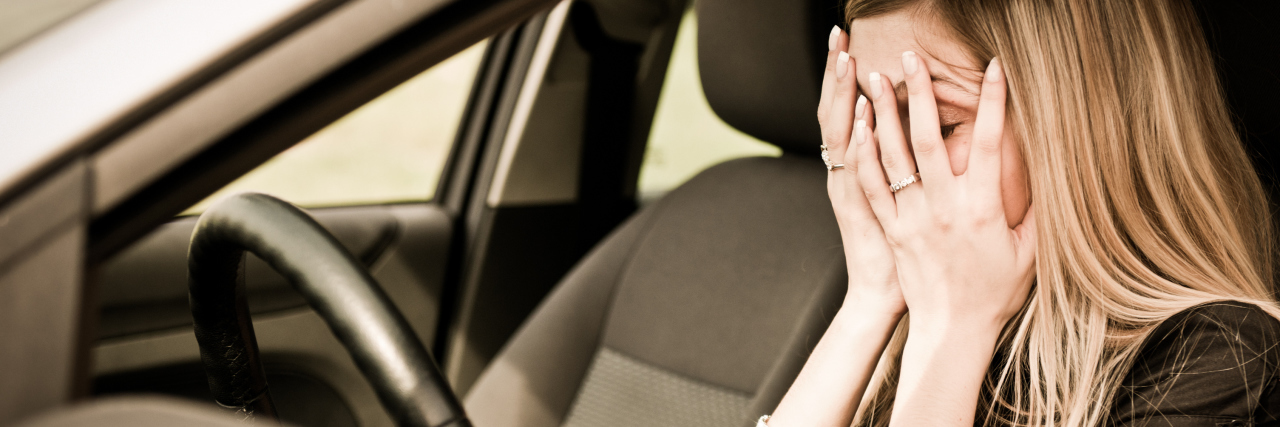If you’ve ever had one, you know there’s nothing more vital than finding ways to cope with panic attacks.
Panic attacks are the worst feeling in the world. Those of you who had or still get them, understand when I say that having a panic attack feels like you are dying. Some of the symptoms include chest pain, a rapid heartbeat, sweaty hands, dizziness, vertigo and a sense of being separate from your body.
And, of course, you’re unable to sit still.
Panic attacks truly take a physical and mental toll on one’s body. They are exhausting. That’s why you need to find ways to cope with panic attacks.
When my own panic attacks hit their highest peak, they nearly consumed me as a human being. I used to call in “sick,” simply walk out of college classes and turn around to go straight home. Home was the only place where I felt, well, not judged and most importantly not making a fool out of myself for having an attack in public. Every Nervous Nellie’s fear.
Fortunately, going to therapy was what ultimately saved my life. I wanted professional help.
At first, I decided to go to therapy for a few sessions and learn how to “control” it. I learned that to “control” the anxiety and not let it “control” you is one of the first steps. One also must learn how to stop or sit through a panic attack if they do happen in a public setting.
Therapy can be expensive though. So can over-the-counter or prescription medicines.
Although going and talking to a therapist and/or taking medicine works for some, it may not work for others for financial or other personal reasons.
These are not the only two solutions to kicking anxiety’s butt. I highly encourage you to go to therapy and/or take medicine if that is what you want for yourself. Understanding all of your treatment options lets you find exactly what works for you.
So, I want to share the tools that my own therapist recommended to me.
1. Therapy.
If you are able to do so, both financially and time-wise, therapy really is one of the best ways to cope with panic attacks.
2. Taking medicine.
Again, if you are financially able to do so, medication can help calm you so that you can get through your days, panic free.
3. Get outside.
Whether for a walk or run, it is amazing what fresh air and being surrounded by Mother Nature will do for your body and mental state.
4. Write.
Journaling about your feelings will truly open you up to not only addressing the elephant in the room, but to realize that, whatever it is that has you feeling on edge, there’s a way to feel better.
5. Meditate.
I don’t know about you, but my own attacks would tense up my shoulders and neck. I missed school for a few days because I had mistaken it for a strained neck. Look into different types of meditation breathing methods if you feel the same way.
A helpful one is body relaxation, where you push out your belly as you inhale and suck in your belly as you exhale. This helps you refocus and get through a panic attack.
6. Yoga.
Yoga is similar to meditation in terms of the breathing techniques, but provides a more physical workout. What a great way to help your body focus on something other than your panic attacks.
7. Music.
Whether making or listening to it, music can really help you stay calm and forget about your panic. So, go to a concert, turn on the radio or make a new playlist today.
8. Cleaning.
Cleaning gives you something new to focus on and gives your body an outlet for the energy you’re feeling when you start to panic.
9. Driving.
When I first started getting severe panic attacks, my biggest fear was passing out from it, especially behind the wheel. Thankfully, after being informed and doing some research on my own, I learned that anxiety occurs when one is over-oxygenated.
So, in reality, it is close to impossible to pass out from a panic attack because it actually makes you alert.
However, it still might be dangerous to drive during a panic attack, so if you feel one coming on, pull over right away until it passes.
10. Get on stage.
Whether for a play, improvisation, singing, teaching or to simply talking about your own personal relationship with anxiety, public speaking can help normalize the anxiety because even the most sociable and outgoing individual will freeze when it comes to public speaking. You’ll feel a bit better knowing you aren’t the only one feeling like you do.
Follow this journey on the author’s website, Instagram and Twitter.
We want to hear your story. Become a Mighty contributor here.
Getty Images photo via Martinan

